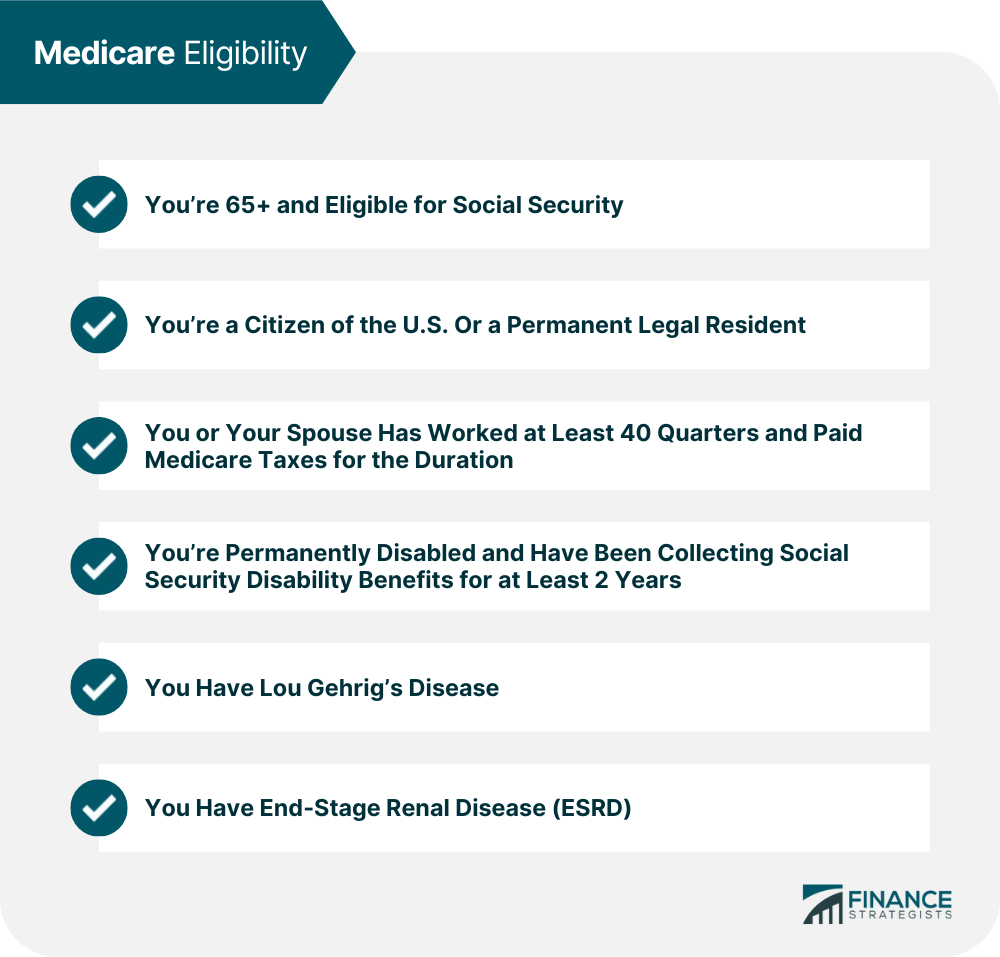Not everyone is eligible for Medicare. If you want to collect benefits under this federal insurance program, you will have to meet certain eligibility requirements. And what does Medicare eligibility mean? Many people confuse being eligible for Medicare with being eligible for Medicare Part A, which are two separate things. In general, Medicare is offered to people who are at least 65 years old, or are disabled. If you are at least age 65, you are usually able to receive Medicare Part A (hospital insurance) and Medicare Part B (medical insurance). You have to be a citizen of the U.S. or else a permanent legal resident who has lived here for at least five years in a row. Have questions about Medicare? Click here. If you are under age 65, then you can still receive Medicare benefits if you fall into one of the following categories: If you or your spouse are 65 or older and did not pay Medicare taxes during your working years, you may be able to buy Part A if you are a U.S. citizen or permanent resident. If you are eligible for Medicare Part A, then you won't have pay a monthly premium if you fall into one of these two categories: If you meet all of the other eligibility requirements for Medicare and you have collected Social Security benefits for at least the previous four months before turning age 65, then you will generally receive Medicare benefits (Parts A and B) during the first month of the year that you turn 65. If you're not automatically enrolled in Medicare Parts A and B, then you'll probably have to file an application with the Social Security Administration. You can enroll in both programs during the seven months surrounding your 65th birthday, three months before and three months after plus of course the actual month of your birthday. If you are younger than 65 and meet all other Medicare eligibility requirements, then you can qualify for benefits under the following circumstances: Everyone who receives Medicare coverage is eligible for prescription drug coverage, regardless of income, age, health status or prescription drug use.Medicare Eligibility

Medicare Benefits Requirements
Medicare Benefits
Who Is Eligible for Medicare? FAQs
Medicare is a publicly-available health insurance program run by the U.S. government.
Medicare provides health coverage to those who are 65+ (or if you have a disability, regardless of age). Medicaid by contrast is available for those with very low income.
Typically, everyone who is 65 or older, or suffers from a disability is eligible for Medicare.
Medicare Part A is free for most people. For those who don’t meet the criteria for free Medicare Part A, the cost is $505 per month if you paid Medicare taxes for less than 30 quarters over the course of your working career.
Medicare is composed of four parts – Part A (Hospital Insurance), Part B (Medical Insurance); Part C (Medicare Advantage Plans), and Part D (Prescription Drug Coverage).
True Tamplin is a published author, public speaker, CEO of UpDigital, and founder of Finance Strategists.
True is a Certified Educator in Personal Finance (CEPF®), author of The Handy Financial Ratios Guide, a member of the Society for Advancing Business Editing and Writing, contributes to his financial education site, Finance Strategists, and has spoken to various financial communities such as the CFA Institute, as well as university students like his Alma mater, Biola University, where he received a bachelor of science in business and data analytics.
To learn more about True, visit his personal website or view his author profiles on Amazon, Nasdaq and Forbes.











